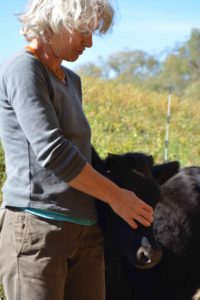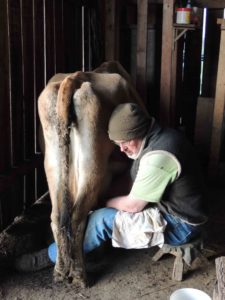147: Shawn and Beth Dougherty on Farmsteading
Utilizing managed intensive grazing to maximize benefit for land and animals.
 Shawn and Beth have been farming together since the 1980’s, for the last twenty years in eastern Ohio, where they manage 24 acres designated by the state as ‘not suitable for agriculture’. Using intensive grazing as the primary source of food energy, they raise dairy and beef cows, sheep, farm-fed hogs, and a variety of poultry, producing most of the food, and feed, on the farm.
Shawn and Beth have been farming together since the 1980’s, for the last twenty years in eastern Ohio, where they manage 24 acres designated by the state as ‘not suitable for agriculture’. Using intensive grazing as the primary source of food energy, they raise dairy and beef cows, sheep, farm-fed hogs, and a variety of poultry, producing most of the food, and feed, on the farm.
Concerned that farming is so often dependent upon multiple off-farm resources, from feed, fuel and fertilizer to water and electricity, their ongoing project is to identify and test the means by which farming was done for centuries with a minimum of off-farm inputs. Their research has led them to identify grass conversion, especially the daily conversion of grass into milk by dairy ruminants, as a key to whole-farm sustainability, combined with the integrated nutrient feed-backs that are possible with a community of diverse animal and plant species, domestic and native. Together they are the authors of The Independent Farmstead, Chelsea Green Publishing 2016.
In This Podcast: Greg is thoroughly impressed with the transformational successes of Shawn and Beth on their “really trashy” plot of land to the diverse, beautiful, and healthy pasture they now enjoy. They tell their story of how they bought what they could afford were prompted to do research and replicate the methods of grazing that preceded the modern day mass production farms. They explain why managed grazing is important and so beneficial to both the animals and the land they occupy.
Listen in to Learn About:
- How they met and had a willingness to try farming
- Why they bought the “really trashy” plot of land that they started with
- Their introduction to pigs, and how they got their first cow

Beth and the Cows
- Why getting that cow made such a difference
- What made the difference with how they pastured the cow
- How they used their goats to clear the property
- How and what ruminants eat, and what that does to the land if managed well
- What intensive rotational grazing is and why it is so important
- How the grazing changed the land to something beautiful
- How they only sowed a handful of clover just once on the property where the ruminants are grazing
- How they learned about this process
- Some of the early resources and research they found to help learn about Intensive Rotational Grazing
- How they got involved in the writing of their book from their blog and how they got so many requests
- What there first draft was like and what the first responses were like
- Why it is important to help people learn how to farm without not being too expensive.
- Why securing our local food sources is important
- How can an urban farmer make a difference with their chickens, for themselves and for the chickens
- Some suggested improvements for chickens feeding and housing

Shawn busy milking
As well as:
- The lesson she learned about keeping an eye on your animals and envisioning their space from the aspect of the animals
- What they think their biggest success is and how it relates to their concept of how everything is connected
- How “love” drives them to do what they are doing and how they have an obligation to make the land better
- Their advice is to “Jump In and let that experience be your classroom” and “This system works so you need to believe in the system and keep trying”
Book written by Shawn and Beth:
The Independent Farmstead: Growing Soil, Biodiversity, and Nutrient-Dense Food with Grassfed Animals
Shawn and Beth’s Recommended Books:
Wendell Barry – anything he wrote
Joel Salatin – Salad Bar Beef, Pastured Poultry Profit$
Eliot Coleman – Four Season Harvest
You Tube videos by: Greg Judy or Soil Carbon Cowboys
Ted Talk by Alan Savory – desertification
How to reach Shawn and Beth:
Website: onecowrevolution.wordpress.com
*Disclosure:
Some of the links in our podcast show notes and blog posts are affiliate links and if you go through them to make a purchase, we will earn a nominal commission at no cost to you. We offer links to items recommended by our podcast guests and guest writers as a service to our audience and these items are not selected because of the commission we receive from your purchases. We know the decision is yours, and whether you decide to buy something is completely up to you.






